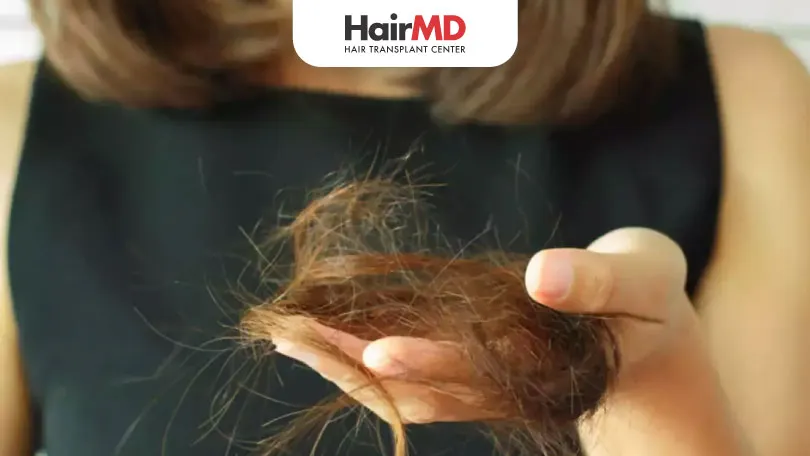
Your crash diet has helped you lose weight and become slender. But it seems your hair also went on a diet and slimmed down to lose roots. Of course, it could worry anyone. But in most cases, hair loss after weight loss is temporary.
Common causes include the stress the body undergoes during dieting and nutrition deficiency. Hair loss after crash dieting is termed telogen effluvium. It occurs about three to four months after quick weight loss and continues for up to five to six months.
Fine! So, now you must be wondering, will hair loss from weight loss grow back? What to do for crash diet hair loss recovery? Let’s answer these questions.
What’s covered in the article?
- Hair Loss and Weight Loss – Causes
- Is Hair Loss a Reason After Weight Loss a Reason to Worry?
- Crash Diet Hair Loss Recovery?
- Will Hair Loss from Weight Loss Grow Back?
- Conclusion
Hair Loss and Weight Loss – Causes
As mentioned earlier, the most common causes are body stress and nutrition deficiency. But in the latter case, crash dieting involves restricting your diet. Doing so deprives your body of several nutrients and calories to grow hair properly. When your body doesn’t receive what it needs, it responds to the situation with something like hair loss.
Diet and hair loss in females also are linked. Per research on a particular number of women with diffuse hair loss, the most common cause of the latter was an iron deficiency and psychological stress. A few of them suffering from hair loss were on crash diets!
Another reason is diet is deficient in protein content. Amino acids, which are the building blocks of protein, are essential for hair growth. They foster the production of keratin, the hair’s primary structural protein. Inadequate protein leads to weakened hair and hair loss. It is because, in situations like these, the body looks after more crucial functions like tissue repair, water balance regulation, digestion, pH, and hormone production. Hair growth takes the backseat.
Is Hair Loss a Reason After Weight Loss a Reason to Worry?
In other words, is telogen effluvium a reason to worry? It usually isn’t – meaning, hair loss due to weight loss isn’t harmful or permanent. In most cases, the body adjusts within a few months, and hair regrows.
But what’s worrisome is the nutrient deficiencies resulting from the crash diet. For instance, reducing iron intake could cause anemia, leading to various health complications like heart problems, depression, infections, etc.
Thus, finding out the real cause of hair loss after weight loss is necessary to ensure your body isn’t deprived of what it requires to stay healthy.
Crash Diet Hair Loss Recovery
You may prevent and treat crash diet hair loss. It involves a proper diet plan with the right nutritional (macro and micro) balance. Based on individual suitability, foods rich in iron and zinc can form part of the diet. They include nuts, eggs, spinach, cashews, legumes, etc., to balance out your weight loss and hair retention endeavor.
Will Hair Loss from Weight Loss Grow Back?
As mentioned earlier, weight loss is a significant process for the body. Hence, the body takes time to adjust. Generally, hair regrows without requiring you to do anything. But even then, you must find out what’s causing hair loss to assess the reason and its severity. If an acute nutritional deficiency is a reason, you should feed your body with the proper nutrition to regrow hair and avoid complications in the future.
Do You Know?
Nearly 250 Patients Visit HairMD
Everyday For Various Hair Concerns?
(Your journey to healthier and fuller hair starts here!)
Meet Our Dermatologists
Conclusion
Recovering from hair loss caused by crash dieting is a gradual process that requires patience and commitment. By focusing on a balanced diet rich in essential nutrients, incorporating supplements as needed, and maintaining a healthy lifestyle, you can promote hair regrowth and overall well-being. It’s also important to consult with a healthcare professional or dermatologist to address any underlying issues and receive personalized advice. Remember, sustainable dietary habits and proper care are key to ensuring long-term hair health and preventing future hair loss episodes.
Further Reading
Top Hair Growth Treatments for Women: Your Ultimate Guide
Find effective hair regrowth treatments for women. Explore solutions like PRP, medications, and more to combat hair loss with expert advice from HairMD.
Relation Between Masturbation and Hair Loss
Is there a relation between masturbation & hair loss? Uncover truth with our detailed analysis, separating fact from fiction to provide clarity on this common concern.
Biotin for Hair: Effective or Overrated? | HairMD Pune
Biotin is popular for hair growth, but does it really work? Find out what HairMD Pune experts reveal about its benefits and limitations.
Is Male Pattern Baldness Dominant or Recessive?
Male pattern baldness is not simply dominant or recessive. Learn the genetics, myths, and treatments available at HairMD Pune.
Have thoughts? Please let us know
We are committed not only to treating you, but also educating you.










